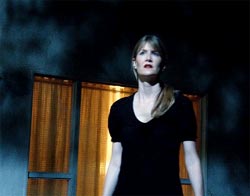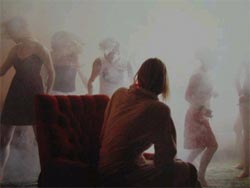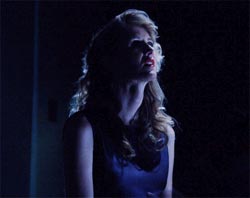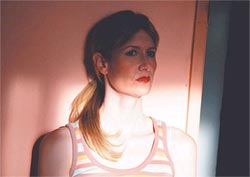 Inland Empire (2007, Dir. David Lynch):
Inland Empire (2007, Dir. David Lynch):
Wake up and find out what the hell yesterday was about. I’m not too keen on tomorrow, and today’s slipping by.
— Nikki Grace, Inland Empire
David Lynch — what to do with him? A free-spirited artist, he ironically does his best work when he’s forced to operate under certain strictures (the “TV pilot plus extra footage” genesis of Mulholland Dr., the Twin Peaks TV series). And now he’s back with his most experimental, confounding feature-length project yet, Inland Empire. Shot on low-grade DV and three hours long, resistant to any form of straight formal interpretation, Inland Empire is the giant outpouring of Lynch’s id, but while that id in the past might have contained some pretty ugly, revolting stuff (just check out Lost Highway or Wild at Heart), here we find him in a more meditative (dare we say transcendental?) mode.
Referring to a certain location in southern California (but obviously referencing the darker, more free-form parts of our heads), Inland Empire has something old, something new, something borrowed, and something Blue Velvet from Lynch’s previous work. A lot of the faces are familiar (Laura Dern, Harry Dean Stanton, Diane Ladd, Grace Zabriskie), and the tropes are comfy enough (“a woman in trouble”), and yet the feel is different. Almost Kubrickian in its coolness (a lot of The Shining is channeled in those wide pans of empty hallways, and there’s a quote straight from 2001 in which a character sees herself a few minutes in the future), Lynch has taken the free-associative conclusion of Mulholland Dr. and cracked the approach wide open with this one. More moody than nightmarish, Inland Empire favors the journey over any destinations; it doesn’t follow any sort of logic or rhythm, but some of the eddies and currents are seductive enough to get lost in for a while.
 There’s no point to a plot synopsis, although tendrils of narrative creep in every so often. Laura Dern plays an aging actress named Nikki Grace (an amusing conflation of porn-star first name and spiritually-aware last name) who is called in to do a Douglas Sirk-like melodrama called On High in Blue Tomorrows, starring opposite young hotshot actor Devon Birk (Justin Theroux). When an ominous Eastern European neighbor from next door (Zabriskie) shows up on her doorstep to warn her about the production, Nikki is bewildered — and then she learns that the film is a remake of a Polish film, 4/7, that was never completed because the lead actors were murdered. In another double parallel, the lead actress in the Polish production was cheating on her husband, much like everyone suspects Grace will cheat on her husband with Devon, which also mirrors the storyline of the film, in which Grace plays Susan Blue, cheating on her husband with Devon’s Billy Side…
There’s no point to a plot synopsis, although tendrils of narrative creep in every so often. Laura Dern plays an aging actress named Nikki Grace (an amusing conflation of porn-star first name and spiritually-aware last name) who is called in to do a Douglas Sirk-like melodrama called On High in Blue Tomorrows, starring opposite young hotshot actor Devon Birk (Justin Theroux). When an ominous Eastern European neighbor from next door (Zabriskie) shows up on her doorstep to warn her about the production, Nikki is bewildered — and then she learns that the film is a remake of a Polish film, 4/7, that was never completed because the lead actors were murdered. In another double parallel, the lead actress in the Polish production was cheating on her husband, much like everyone suspects Grace will cheat on her husband with Devon, which also mirrors the storyline of the film, in which Grace plays Susan Blue, cheating on her husband with Devon’s Billy Side…
But wait, there’s more: an unidentified woman watches a strange sit-com with tears in her eyes. The sit-com, performed by three actors (including Naomi Watts and Laura Harring) in full rabbit costume, can only be described as a deadpan bunny Waiting for Godot. And then there’s those inexplicable scenes in Poland, which seem to be taking place about forty years ago, involving a dead woman and her spirit. And we haven’t even mentioned the film set that morphs into the trailer-trash home of Susan Blue (or is it Nikki in another life?), or the distraught woman with a screwdriver sticking out of her belly (Julia Ormond), or the mysterious portals (or rabbit-holes, as Nikki is a gawky Alice in Wonderland) to other dimensions that are labelled “AXXN” (code for “action,” as in a film take?), or the nameless monster that has Nikki’s face…
 Does it hold together? Not in any conventional sense, not even in the sense that it is all of a piece, even if some of those pieces dangle like hacked-up limbs (the rabbit sit-com, for example, was inspired by short films Lynch created for his website). Unlike his previous movies, there is no single setpiece one can point to like the audition scene in Mulholland Dr., Robert Blake calling himself in Lost Highway, or Dennis Hopper’s assault of Isabella Rosselini in Blue Velvet. (A moment with strippers bopping to “Do the Locomotion” comes close, but Lynch cuts away quickly, as if not wanting to go down that road). Instead, the film is content to drift by in fragments, some relatively close to rational, others seemingly there purely for effect or mood. Any interpretations one can make with this material are inevitably colored by how much one has been Lynch-ed in the past. (You could argue, for example, that Nikki is an older version of Naomi Watts’ Diane from Mulholland Dr., making one last desperate bid for stardom.) Lynch’s feelings about Hollywood in general are as clear as ever, as evidenced by the scene in which Nikki (or is it Susan?) is stabbed in the gut and left to expire on the Hollywood Walk of Fame — and then the scene is itself revealed to be a scene in the movie, which itself might be a scene from another movie, a never-ending, inescapable funhouse, with characters and personas doubled and tripled.
Does it hold together? Not in any conventional sense, not even in the sense that it is all of a piece, even if some of those pieces dangle like hacked-up limbs (the rabbit sit-com, for example, was inspired by short films Lynch created for his website). Unlike his previous movies, there is no single setpiece one can point to like the audition scene in Mulholland Dr., Robert Blake calling himself in Lost Highway, or Dennis Hopper’s assault of Isabella Rosselini in Blue Velvet. (A moment with strippers bopping to “Do the Locomotion” comes close, but Lynch cuts away quickly, as if not wanting to go down that road). Instead, the film is content to drift by in fragments, some relatively close to rational, others seemingly there purely for effect or mood. Any interpretations one can make with this material are inevitably colored by how much one has been Lynch-ed in the past. (You could argue, for example, that Nikki is an older version of Naomi Watts’ Diane from Mulholland Dr., making one last desperate bid for stardom.) Lynch’s feelings about Hollywood in general are as clear as ever, as evidenced by the scene in which Nikki (or is it Susan?) is stabbed in the gut and left to expire on the Hollywood Walk of Fame — and then the scene is itself revealed to be a scene in the movie, which itself might be a scene from another movie, a never-ending, inescapable funhouse, with characters and personas doubled and tripled.
 A hall of mirrors, or smoke and mirrors? Your mileage will vary, as it often does when someone tells you about their innermost obsessions. The segments in Poland, while burnished to a tawdry grandeur, didn’t do much for me, and seemed utterly disconnected in form and tone from the rest of the film. On the other hand, when Nikki (Susan?) takes on the persona of trailer trash and huddles up with a bespectacled interrogator in the back room of a club to give a hilarious confessional, we get a welcome dose of Lynch’s cornball deadpan humor: “When the police came and asked what happened, I told them, ‘He’s reaping what he’s been sowing, that’s what.’ They said, ‘Fucker been sowing some pretty heavy shit.'” Or there’s Harry Dean Stanton as a film studio go-fer, bringing the house down with a simple request to borrow some money.
A hall of mirrors, or smoke and mirrors? Your mileage will vary, as it often does when someone tells you about their innermost obsessions. The segments in Poland, while burnished to a tawdry grandeur, didn’t do much for me, and seemed utterly disconnected in form and tone from the rest of the film. On the other hand, when Nikki (Susan?) takes on the persona of trailer trash and huddles up with a bespectacled interrogator in the back room of a club to give a hilarious confessional, we get a welcome dose of Lynch’s cornball deadpan humor: “When the police came and asked what happened, I told them, ‘He’s reaping what he’s been sowing, that’s what.’ They said, ‘Fucker been sowing some pretty heavy shit.'” Or there’s Harry Dean Stanton as a film studio go-fer, bringing the house down with a simple request to borrow some money.
Lynch’s switch to down-and-dirty DV for this film isn’t a completely successful experiment — few directors these days shoot as strikingly and beautifully on 35mm as he does. But he bravely dives straight to the ugliness of the digital medium, with unflattering close-ups of the characters and moments of apprehension where the empty hallways and darkened spaces are accentuated by fuzzed-out, overexposed textures (it’s clear that Japanese New Wave horror films owe a huge debt to Lynch: the rumbling sound design, the crazy jump cuts where monstrous faces and terror muscle in). Likewise, Dern bravely lets the camera leer at her — filmed in those gritty lens, her features seem positively gargoylish throughout. She’s no spring chicken, but her guilelessness (the prime requirement for a Lynch heroine) shines through. It’s difficult to say if she gives a virtuoso performance, given the vagaries of the personae she plays; on the other hand, she provides the film’s only glimmer of a center, lingering on even as subplots and surreal visions fly off like sparks.
 For all its nonsensical meanderings, the film arrives at a climax within a movie theater (the ultimate funhouse) that is unnerving and ultimately cathartic. Suffice it to say that the crying woman finally stops crying, and those rabbits finally meet their Godot. By the time Nikki finds herself back in her cavernous mansion in the Los Angeles hills, watching in delight as a group of dancers lip-synch to Nina Simone’s “Sinnerman” during the end credits like an outtake from Fame, Laura Harring blowing a kiss to the audience, you might get the idea that this is Lynch’s idea of a joke. (Compare the final line of this film, “Sweet,” to the final line of Mulholland Dr. (“Silencio”).) More accurately, it’s his idea of a cosmic lark, where these astringent narratives can be forsaken in favor of a kiss at the end — we know we’ve been on a head trip, but the heart sneaks up on us.
For all its nonsensical meanderings, the film arrives at a climax within a movie theater (the ultimate funhouse) that is unnerving and ultimately cathartic. Suffice it to say that the crying woman finally stops crying, and those rabbits finally meet their Godot. By the time Nikki finds herself back in her cavernous mansion in the Los Angeles hills, watching in delight as a group of dancers lip-synch to Nina Simone’s “Sinnerman” during the end credits like an outtake from Fame, Laura Harring blowing a kiss to the audience, you might get the idea that this is Lynch’s idea of a joke. (Compare the final line of this film, “Sweet,” to the final line of Mulholland Dr. (“Silencio”).) More accurately, it’s his idea of a cosmic lark, where these astringent narratives can be forsaken in favor of a kiss at the end — we know we’ve been on a head trip, but the heart sneaks up on us.

